Catégories
|
Thésaurus IAMM > CHAINE D'APPROVISIONNEMENT
CHAINE D'APPROVISIONNEMENTSynonyme(s)Supply chain Chaîne logistiqueVoir aussi |
Documents disponibles dans cette catégorie (767)
 Ajouter le résultat dans votre panier Affiner la recherche
Ajouter le résultat dans votre panier Affiner la recherche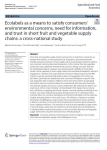
Article
Short food supply chains (SFSCs) are increasingly regarded as promising alternatives to industrialized food distribution systems. They aim to create geographical, logistical, and social proximity between food producers and consumers. Despite ext[...]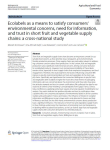
Article
M. Aminravan ; S.A. Kaliji ; L. Mulazzani ; C. Rota ; L. Camanzi |Short fruit and vegetable supply chains have become an important context for sustainable food systems, as they prioritize local, transparent, and environmentally friendly production processes. These supply chains are particularly relevant in add[...]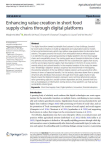
Article
M. Masi ; M. De Rosa ; C. Charatsari ; E.D. Lioutas ; Y. Vecchio |The digital transition toward sustainable food systems is a key challenge, boosted by recent policy initiatives to build up digitalized and sustainable business models at farm and territorial levels, which may address new opportunities for alter[...]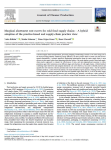
Article
Cold food supply chains (transportation, processing, shipping, warehousing) consume 19 % of the energy use in the food processing industry. Enhancing energy efficiency can have positive effects on both costs and environmental sustainability. A s[...]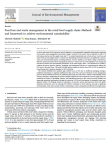
Article
Food loss and waste (FLW) represents critical challenge to environmentally sustainable development, impacting food security, waste management, and climate change. One-third of the world's food is disposed of, with 13 % lost between harvest and t[...]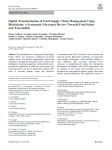
Article
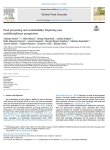
Article
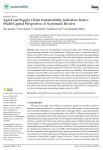
Article
A. Amamou ; S. Chabouh ; L. Sidhom ; A. Zouari ; A. Mami |The concept of sustainability in agri-food supply chains (AFSCs) is gaining traction among researchers and practitioners. There has been a considerable effort to define and identify frameworks for assessing, monitoring, and improving sustainabil[...]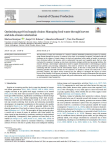
Article
Optimising agri-food supply chains: managing food waste through harvest and side-stream valorisation
The importance of reuse and valorisation as a means to enhance sustainable production practices, by reducing waste streams through the recovery of resources in the chain, is increasingly recognised. Confronted with new challenges in the context [...]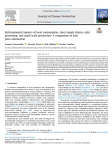
Article
L. Giacomella ; T. Rowe ; E. Mathijs ; L. Vranken |Novel food supply initiatives that hinge on mild processing, small-scale production, local sourcing of inputs, or short distribution chains are often proposed as an option to reduce the environmental impacts caused by food production and consump[...]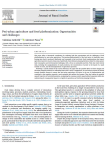
Article
This paper offers a theoretical contribution by outlining both the opportunities and the challenges of food platformisation for peri-urban agriculture. The growing platformisation of the food sector is drastically transforming how food is produc[...]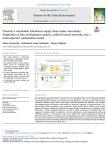
Article
The viticultural supply chain plays a critical role in the agricultural sector, yet its optimization remains understudied despite its economic, environmental, and social significance. This study proposes a multi-objective, sustainable viticultur[...]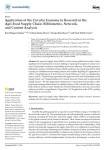
Article
The agri-food supply chain (AFSC) is vital to ensure global food security. It faces significant environmental and economic challenges, requiring the adoption of circular economy (CE) principles to enhance sustainability and resource efficiency. [...]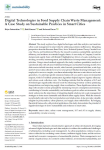
Article
This study explores how digital technologies and data analytics can transform urban waste management in smart cities by addressing systemic inefficiencies. Integrating perspectives from the Resource-Based View, Socio-Technical Systems Theory, Ci[...]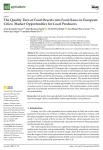
Article
L. Fernández-Casal ; E. Karakaya Ayalp ; S.P. Öztürk ; L.M. Navas-Gracia ; F. Geçer Sargin ; J. Pinedo-Gil |The current conventional food system is led by large-scale agribusinesses, characterized by industrialized production and increasing distance between food production and consumption. In response, alternative food initiatives (AFIs) have typicall[...]
Article
This article analyses the impacts of the Russia-Ukraine conflict and the COVID-19 pandemic on the supply chain and logistics related to the management of agro-food production based on a comprehensive review of the scientific literature. The chal[...]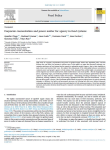
Article
High levels of corporate concentration and power in agrifood supply chains raise important policy concerns because they can affect food systems in adverse ways. In this paper, we argue that increased corporate concentration and power in food sys[...]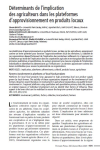
Article
Les plateformes d'approvisionnement en produits locaux, portées par les agriculteurs, apparaissent comme un levier potentiel pour favoriser l'approvisionnement local des territoires. La stabilité de ces organisations dépend fortement de l'implic[...]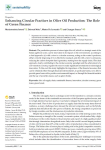
Article
M. Intonti ; D. Mola ; M. De Leonardis ; G. Starace |The production process of extra virgin olive oil, which is a strategic asset of the Italian agrifood sector, can be innovated in its impact on the environment, according to a dual approach: (a) with a view to a circular economy, acting on the wa[...]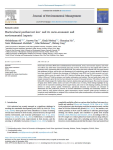
Article
A. Ali ; A. Ali ; Y. Tan ; K. Medani ; C. Xia ; N.M. Abdullahi ; I. Mahmood ; S. Yang |Food losses and waste (FLW) have multidimensional environmental, social, and economic impacts, and avoidance efforts may yield better environmental gains than recovery. Horticulture has the highest FLW (≈50% of production loss), representi[...]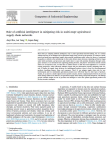
Article
Role of artificial intelligence in mitigating risk in multi-stage agricultural supply chain networks
More firms are adopting artificial intelligence (AI) to assist agricultural decision-making, but it is unclear whether and how AI can mitigate risk in agricultural supply chain. Driven by this question, we construct a multi-period and multi-laye[...]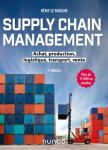
Ouvrage
Qu’est-ce que le supply chain management ? Comment fonctionnent les chaînes logistiques, depuis l’achat de matières premières jusqu’à la livraison client ? Comment améliorer la performance, réduire les coûts et l’impact sur l’environnement[...]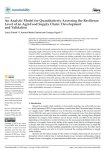
Article
Over the last decade, resilience has become an indispensable aspect to be considered when managing supply chains given to the recent challenges they were subjected to, and a constituting element of their sustainability. However, despite literatu[...]
Article
Garima ; D. Olaru ; B. Smith ; K.H.M. Siddique |Grain supply chains (GSCs) are crucial for global food security, economic development, and environmental sustainability. This study investigates the complexities and challenges of enhancing the resilience of GSCs. The research unravels decision-[...]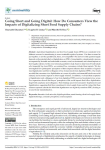
Article
Agricultural digitalization and short food supply chains (SFSCs) are considered to be different avenues for transitioning to more sustainable agrifood systems. Can these avenues be put together, or are they parallel and, hence, not compatible? T[...]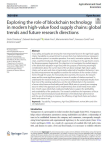
Article
G. Chiaraluce ; D. Bentivoglio ; A. Finco ; M. Fiore ; F. Conto ; A. Galati |Trust, safety, and quality are among the most important factors in the agri-food supply chains. Traceability is a powerful tool to ensure them, but implementing a transparent and effective system is a complex operation. As a result, innovative s[...]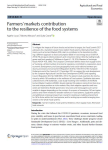
Article
To mitigate the impacts of future shocks and achieve its targets, the Food Summit 2021 advocates for a transition toward more resilient Food systems. Alternative food movements, such as Farmers’ Markets (FM), claim to contribute to this transiti[...]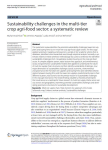
Article
M.A. Khan ; D. Papadas ; L. Arnold ; K. Behrendt |This systematic review identifies the potential sustainability challenges lower-tier suppliers and buying firms face in multi-tier crop agri-food supply chains. The first stage applied systematic mapping, and based on a sample of 487 academic ar[...]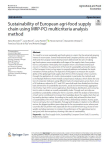
Article
E. Ricciolini ; L. Rocchi ; L. Paolotti ; N. Gennari ; A. Ottaviani ; F.R. de la Rúa ; A. Boggia |The need for a more sustainable agri-food system is a topic that has attracted growing interest in recent years. Several international and European policies such as Agenda 2030 and the European Green Deal have been defined with the aim of making[...]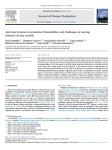
Article
S. Stempfle ; D. Carlucci ; M. Borrello ; L. Cembalo ; B.C. de Gennaro ; L. Roselli ; G. Giannoccaro |The Circular Economy (CE) has emerged as a paradigm for transitioning economic systems toward increased sustainability. The shift toward circular systems requires profound changes and presents challenges at various levels, involving a comprehens[...]










